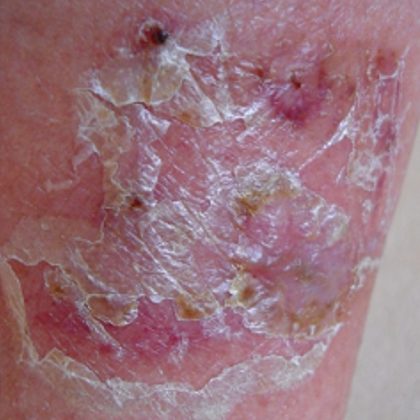Eczema
One in 10 will develop eczema (dermatitis) during their lives. Roughly 31.6 million Americans have some kind of eczema, a rash which presents with red, swollen, scaly skin. Eczema isn’t contagious, but there are many different types of eczema. All are irritating, itchy, and in many cases, cause sufferers emotional stress due to their appearance.
Eczema most often appears in childhood, but it can present at any age and get better or worse over time. While we aren’t sure what causes eczema, we do see possible genetic and environmental factors which may contribute.
Due to the difficulty in treating and preventing eczema, many sufferers spend a lot of time and money on home remedies which are unhelpful or even harmful. It’s important to engage with a board-certified dermatologist for help with your eczema.
Do You Have Eczema?
Any skin rash should be evaluated by a board-certified dermatologist. The primary concerns with any rash are:
- Is the rash a symptom of another illness which requires evaluation and treatment?
- Is the rash contagious?
Eczema is not contagious, but it can be an indication of an underlying health concern. Either way, book a consultation at a dermatology clinic like the Laser and Skin Surgery Center of Indiana (The LASSI), located in Indianapolis.
Your First Appointment
Our team of dermatology experts, led by board-certified dermatologist Dr. C. William Hanke at The LASSI, can evaluate a skin rash to provide you with a diagnosis and treatment plan.
We will discuss a few things, including:
- Onset of the rash and changes over time
- Previous treatments, including prescriptions and home remedies
- Other relevant health history and prescriptions
If we determine that you have eczema, we will work to determine what type of dermatitis you have, attempt to identify triggers, and work to treat the rash and symptoms such as itching and swelling.
Types of Dermatitis

There are several different types of dermatitis, including:
- Atopic dermatitis is the most common kind of eczema, and it’s most often found on babies and children.
- Contact dermatitis is triggered by contact with an irritant. It’s easier to identify the source of the rash in these cases, which allows us to simultaneously treat the rash while eliminating the cause. Common causes of contact dermatitis include jewelry, laundry detergent, and cosmetics.
- Dyshidrotic eczema often appears as blisters on the hands and feet and can be traced back to exposure to an irritant or allergen.
- Hand eczema is often mistaken for dry skin, but scales, inflammation, and even bleeding are sure signs that you need more than hand lotion to manage symptoms.
- Neurodermatitis doesn’t affect a large area like atopic dermatitis. It’s usually confined to a few small patches of skin with all the other hallmarks of eczema, including scaly skin, inflammation, and itching.
- Nummular eczema are round patches of irritated skin which itch and burn, weep fluid which crusts over, and cause significant inflammation. It is often mistaken for ringworm and other fungal infections.
- Stasis dermatitis is unique in that it’s connected with poor blood circulation and varicose veins. When blood and other fluids settle in the feet, it causes skin irritation and inflammation.
Again, it’s crucial to have a skin condition or rash evaluated by a board-certified dermatologist in order to determine what you’re dealing with and how to treat it. Don’t waste time and money guessing on what might help when you can receive expert care from a team of dermatology providers.
How Eczema is Treated
Treatments for eczema are as varied as the types of dermatitis. In some cases, if a cause can be identified, elimination is prescribed to avoid the irritant. Allergy testing may be recommended as well.
Most treatments include a rigorous at-home skin care routine which combines topical corticosteroid creams and heavy duty moisturizers free of dyes and perfumes. Dermatologists also recommend avoiding body wash, bubble baths, and bath bombs containing added dyes and perfumes. Overly drying body washes and bar soaps are also to be avoided. In some cases, we may recommend bleach bath therapy, home humidifiers, and clothing material changes to reduce infection, dryness, and irritation.
Why Choose the Laser and Skin Surgery Center of Indiana for Help With Dermatitis?
The Laser and Skin Surgery Center of Indiana (The LASSI) is first and foremost a dermatology practice. Led by board-certified dermatologist Dr. C. William Hanke, the LASSI offers evaluation and treatment for numerous skin conditions in a medical setting while running clinical trials for new treatment protocols.
Dr. Hanke also lectures internationally to physicians, has served as board president for several skin care and dermatology organizations, and has a large library of peer reviewed publications related to skin conditions and treatments.
Book an Appointment Today
If you have a rash, suspect you have eczema, or you just want to treat your dry skin, book an appointment in our Indianapolis dermatology clinic.


